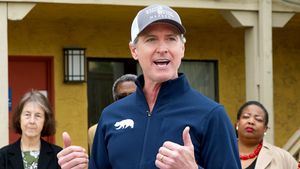Treatment GuideJust DiagnosedSex & DatingAfrican AmericanStigmaAsk the HIV DocPrEP En EspañolNewsVoicesPrint IssueVideoOut 100
CONTACTCAREER OPPORTUNITIESADVERTISE WITH USPRIVACY POLICYPRIVACY PREFERENCESTERMS OF USELEGAL NOTICE
© 2025 Pride Publishing Inc.
All Rights reserved
All Rights reserved
Scroll To Top
By continuing to use our site, you agree to our Privacy Policy and Terms of Use.
Justin Goforth, positive for 18 years, once received treatment at an HIV clinic sponsored by the National Institutes of Health. The NIH eventually closed the clinic, Goforth says, because the patients, all on antiretroviral regimens, showed no signs of illness. And sick people were what doctors-in-training came to the NIH to study. 'The medical fellows that came to NIH to learn infectious disease specialty care weren't getting that experience,' Goforth says. 'Once you get people on a regimen then it's just about primary care and not about the infectious disease care anymore.' Goforth, a nurse and a director of several programs at Washington, D.C.'s Whitman-Walker health center, now gets his medical needs met through his internist. It's been 30 years since AIDS was first diagnosed in the United States, and in that time much has changed'prevention, treatment, life expectancy. But the relationship between doctor and HIV patient may not have evolved along with treatment of the disease. Some experts are now calling for a shift: Where infectious disease specialists once cared for HIVers, now primary care physicians are being called upon to take over treatment. This issue came to the forefront after an Institute of Medicine report in March documented a shortage of HIV specialists (due largely to the fact that this field often pays less than other specialties, so fewer doctors enter this area) and asserted the problem will only worsen. Weeks later, the Los Angeles County Department of Health Services director, Mitchell Katz, MD, wrote in Archives of Internal Medicine that HIV is a chronic, treatable disease that can and should be handled by more general practitioners. Frank Spinelli, MD, a Manhattan internist who treats many HIV-positive patients and previously served as the clinical director of HIV services at New York City's Cabrini Medical Center, agrees with many of Katz's points but offers some caveats. Keeping up with advances in the disease takes a lot of time, he says, and if your doctor isn't making an effort in that regard, you can suffer. 'I'm constantly going to meetings about HIV,' he says. 'I'm involved in clinical trials where I learn about the new advances. I think if I was an internist in a small town, I wouldn't necessarily know this stuff.' Spinelli compares the situation to that of a primary care physician reading an electrocardiogram, something usually done by a cardiologist'an internist like Spinelli could read the EKG, but if something didn't look normal, the expertise of a heart doctor would be needed. 'The same thing happens when an HIV-positive patient does not become routine, where something might change or get worse or abnormal,' Spinelli says. 'I'm scared to think that a primary care doctor may not have the capacity to actually take care of those changes.' Self-education is imperative for primary care physicians who are relatively new to treating HIV-positive people, Spinelli says. Reading up on HIV reports and journals and staying on top of the newest medications is a must. 'It would be an injustice to you if you had HIV and your doctor was prescribing something to you that's ancient,' he says. While Spinelli does believe most HIVers who adhere to their regimens aren't substantially more or less healthy than people without the disease ('Now we tell HIV-positive patients that you're probably going to die from what everybody else is going to die from'a heart attack'), there are still conditions specific to HIV that all doctors must be aware of. Preventative measures like male Pap smears'helpful because of the prevalence of anal cancer among HIV-positive men'and vitamins to fight meds-related bone weakening are things any good doctor should suggest to HIV-positive patients. Certain HIV-related issues do warrant seeking an infectious disease specialist, according to William Cunningham, MD, MPH, a professor at the University of California, Los Angeles, School of Medicine. 'Pretty much any cancer-related complication like Kaposi's sarcoma' requires someone highly educated on the subject of HIV, Cunningham says. 'Lymphoma or any of the blood-related disorders as well.' For those in rural areas where HIV and infectious disease doctors are scarce, Spinelli suggests seeking out university medical centers, located in almost every state, when they need specialized care. But if you're in generally good health and live outside of an area with many options for physicians, a general practitioner may be the most practical choice. But that doesn't mean you can't be choosy about your GP'there are specific questions to ask your doctor to ensure he or she has your best interests at heart. If you're seeking a new doctor, the first question to pose is if they're comfortable treating HIV. 'Even in New York, a lot of doctors don't want to do [HIV care],' Spinelli says. 'It's complicated, people are scared of it. You'd have to say, 'I'm HIV-positive'how comfortable are you treating HIV? What is your experience? How many patients do you treat with HIV? Are you involved with any research? Where do you get your information? Do you attend conferences?'' Coming from a place of anxiety, though, is not helpful, Cunningham says. This new treatment paradigm offers benefits as well as concerns. 'As people with HIV get older, just like other people they're more likely to develop conditions like diabetes, heart disease, arthritis, kidney disease, and hypertension,' Cunningham says. 'Those conditions are best managed by a primary care doctor who can put together the whole picture and treat all the conditions at the same time.' For an HIV patient like Goforth, a doctor who considers his overall health in an effort to lead him toward a long life is crucial, he says. Though not an infectious disease specialist, his internist is especially knowledgeable about HIV'something that needs to start becoming the rule instead of the exception. 'My doctor says he can train a primary care physician in about two days on how to provide HIV care,' Goforth says. 'But that two days of training is very necessary. Going to a doctor who has no history of serving that population is risky.' Exposure to more HIV-positive patients during medical school and residency programs will help ensure a wider breadth of HIV knowledge for primary care physicians, Spinelli says. That will be necessary, as a reversal in the shortage in HIV specialists is unlikely. The fact of the matter, say both Spinelli and Cunningham, is that infectious disease doctors who specialize in HIV care typically have more work and complications'and makes less money'than an obstetrician, for example. A love for the work is what pushes people into treating AIDS, says Spinelli, who trained in the 1980s at places such as New York's St. Vincent's Hospital, a huge center for AIDS care at the time. Back then, people were dying at alarming rates, and the passion to save them led many to get into the field. Now that the disease is manageable, working with HIV is less of a passion project, Spinelli says. 'When I go to HIV meetings every year, I look behind me and there's no one younger than me,' Spinelli says. 'I'm looking for the next generation and I don't see them. There's a shortage of HIV doctors even though the number of HIV-positive people is going up.' That's why the shift to primary care doctors treating HIV-positive patients must begin in earnest, Spinelli says. It's not only important, but like once-a-day regimens, having one doctor who fulfills all your needs brings a little more normality to lives of HIVers. 'I can go see an infectious disease specialist and a primary doctor, but that would be a pain in my rear end,' Goforth says. 'I'm a very busy man.'
From our Sponsors
Most Popular
Lexi Love comes out as HIV+ after Trump deletes federal resources
January 23 2025 11:23 AM
Grindr is reminding us why jockstraps are so sexy and iconic
May 02 2025 5:36 PM
BREAKING NEWS: Trump admin moves to end federal HIV prevention programs
March 18 2025 6:10 PM
Trump's orders prompt CDC to erase HIV resources
January 31 2025 5:29 PM
Celebrating Black History Month with our annual African American issue
February 01 2025 3:28 PM
Tyler TerMeer vows to continue to fight for health care for all
January 28 2025 3:00 PM
Discover the power of Wellness in your life
March 26 2025 12:41 PM
Plus: Featured Video
Latest Stories
Dancer. Healer. Survivor. DéShaun Armbrister is all of the above
July 02 2025 8:23 PM
Two right-wing Supreme Court justices signal they may uphold access to PrEP and more
April 21 2025 4:10 PM
Broadway's best raise over $1 million for LGBTQ+ and HIV causes
April 03 2025 7:15 PM
Plus nominated for 2025 GLAAD Media Award
January 22 2025 12:42 PM
'RuPaul's Drag Race' star Trinity K Bonet quietly comes out trans
December 15 2024 6:27 PM
AIDS Memorial Quilt displayed at White House for the first time
December 02 2024 1:21 PM
BREAKING: Supreme Court rules to save free access to preventive care, including PrEP
June 27 2025 10:32 AM
1985: the year the AIDS crisis finally broke through the silence
June 26 2025 11:24 AM
Trump admin guts $258 million in funding for HIV vaccine research
June 03 2025 3:47 PM
500,000 Children at Risk: PEPFAR Funding Crisis
April 08 2025 3:51 PM
The Talk Season 5 premieres this spring with HIV guidance for the newly diagnosed
March 26 2025 1:00 PM
Jess King is here to help you live your happiest, healthiest life yet
March 24 2025 4:35 PM
A camp for HIV-positive kids is for sale. Here's why its founder is celebrating
January 02 2025 12:21 PM
VIDEO: A man living with HIV discusses his journey to fatherhood
June 10 2025 4:58 PM
HRC holds 'die-in' to protest Trump health care cuts
April 28 2025 2:11 PM
Season 4 of The Switch on resilience & radical self-love returns this spring
March 26 2025 12:20 PM
Gerald Garth is keeping people of color happy and healthy through trying times
March 11 2025 3:38 PM
This long-term HIV survivor says testosterone therapy helped save his life.
December 16 2024 8:00 PM
Ricky Martin delivers showstopping performance for 2024 World AIDS Day
December 05 2024 12:08 PM













































































